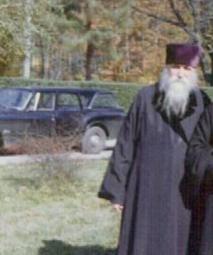22 May 09: Homily on the 6th Sunday of Pascha – Sunday of the Blind Man
6th Sunday of Pascha – Sunday of the Blind Man
Homily From “The One Thing Needful,” Sermons of Archbishop Andrei (Rymarenko)
 Last Sunday, the Sunday of the Samaritan woman, the Holy Church told us how Christ raises a person from an earthly, carnal state of mind to the state in which a human being thirsts to worship God and pray to Him. You see, the Samaritan woman came to the well for physical water which satisfies only earthly thirst. But when Christ revealed her sins to her, and she ran to Him in repentance, then in her awakened spiritual thirst, the thirst for Living Water springing up into everlasting life, the thirst for communion with God, her first question was about prayer: where one should worship God, how to pray. Now today’s Gospel gives us a model for prayer.
Last Sunday, the Sunday of the Samaritan woman, the Holy Church told us how Christ raises a person from an earthly, carnal state of mind to the state in which a human being thirsts to worship God and pray to Him. You see, the Samaritan woman came to the well for physical water which satisfies only earthly thirst. But when Christ revealed her sins to her, and she ran to Him in repentance, then in her awakened spiritual thirst, the thirst for Living Water springing up into everlasting life, the thirst for communion with God, her first question was about prayer: where one should worship God, how to pray. Now today’s Gospel gives us a model for prayer.
“As Jesus passed by, He saw a man which was blind from his birth” (Jn. 9:1). Being blind from birth he had never seen anyone. He could not imagine to himself the form of a man. He had never even seen Christ. He only knew that Christ was passing close by, that He was a miracle-worker and could give him sight. And he began to cry out, to call to Christ: “Jesus, Thou Son of David, have mercy on me!” (Mk. 10:47; Lk. 18:38). The people tried to quiet him; he was interfering with their listening to Christ’s preaching, he was disturbing the peace. Christ was walking, surrounded by His disciples, and they asked: “Master, who did sin, this man or his parents, that he was born blind? Jesus answered, Neither hath this man sinned, nor his parents: but that the works of God should be made manifest in him…. When He had thus spoken, He spat on the ground, and made clay of the spittle, and He anointed the eyes of the blind man with the clay. And said unto him, Go, wash in the pool of Siloam” (Jn. 9:2-3, 6-8).
Let us imagine to ourselves the mental state of this blind from birth. He cried out, called. They pushed him, maybe even forced him to be silent, but he still cried out, begged. Speaking in our terms, he was praying. Finally, that Miracle-Worker Who was invisible to him approached. But He did not perform an immediate miracle. On the contrary. He did something which according to human understanding might appear humiliating, unpleasant. He spat and made clay from the saliva and earth, and smeared the eyes of the blind man. But this wasn’t enough; He sent him with this clay on his eyes to go wash in the pool of Siloam (which means “sent”)- But the blind man didn’t object, he went feeling his way, stumbling, exposed to the mockery of the passersby. Finally he reached the pool and washed. And here, fulfilling all this, enduring all this, he finally recovered his sight and returned seeing.
This is a model of prayer for you and me. After all, we too are spiritually blind and cannot see the Lord. But we know that He exists. Let us call to Him, cry out to Him, begging for help. And let us not despond if this help is not immediately given to us. Maybe we still have to go a long way, not an easy way, like the way for the blind man to the pool of Siloam. On this path we might meet unpleasant things, humiliations, like the clay for the blind man. Let us endure everything. Let us be obedient. Let us do what He orders us to do; let us go the way He showed us, like the blind man’s way to the pool of Siloam. And here, when we have fulfilled all this, then the Lord will answer our prayer, and if it pleases Him, will fulfill it. And the same will happen to us that happened to the blind man. When, through the circumstances of our life, the Lord asks us, “Dost Thou believe on the Son of God?” (Jn. 9:35), we will answer: We believe Lord! and we will worship Him.
Only let us avoid all images during the time of prayer. We must not imagine anything to ourselves; but like the blind man, let us just know that the Lord is near and that He can do anything. And if things seem to turn out opposite to our prayers, let us not despond. But let us hope, hope against hope. And He will do what is beneficial for us. Let us keep the state of mind of the blind man — this is the best form of prayer.

 Sts Cyril and Methodius Orthodox Institute
Sts Cyril and Methodius Orthodox Institute